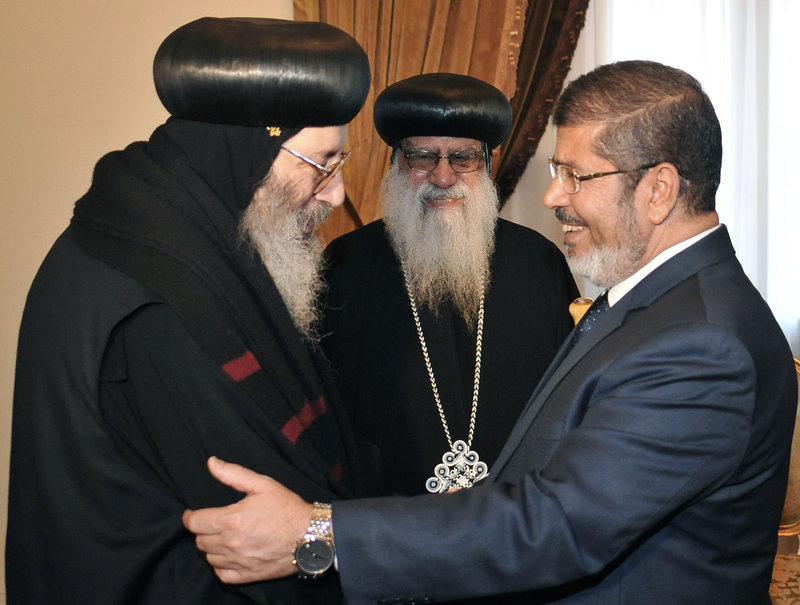CAIRO — President-elect Mohammed Morsi tried to ease the turmoil that has rocked Egypt since the uprising 16 months ago, reaching out Tuesday to Christians, women and secular revolutionaries to join his new Islamist-led government.
Even prominent opponents of Morsi’s Muslim Brotherhood gave cautious support for his effort to end military rule after the generals issued a series of last-minute decrees to try to keep their grip on power.
But it remained unclear how much power the military was willing to cede – and how much authority the Brotherhood ultimately intends to retain for itself.
Dina Zakariya, a Morsi campaign spokeswoman, said the only way forward is to create a national unity government that represents all political forces and all Egyptians.
“The country lived for so long in corruption. No single party can take full responsibility” for tackling the nation’s problems, she said, adding that Morsi is serious about appointing a Christian and a woman as vice presidents and including a range of political factions in the Cabinet.
Morsi was declared the winner Sunday of the first free presidential election in Egypt’s modern history, becoming the first Islamist and the first civilian to hold the office. Since then, backdoor negotiations on a power-sharing agreement between Islamists and the ruling military council have been ongoing.
The deeply polarizing race pitted Morsi against Hosni Mubarak’s last prime minister, Ahmed Shafiq. Many liberals who drove the uprising, as well as women and minority Christians were despondent over the choice between a vestige of the old regime and a candidate they fear might impose stricter Islamic law in Egypt and limit personal freedoms.
In an effort to assuage those fears, Morsi and his Muslim Brotherhood have floated the names of respected liberals, women and Christians to join his government. Among them is former nuclear watchdog chief Mohamed ElBaradei, a leading pro-democracy advocate.
Critics say the Muslim Brotherhood, which dominated in both parliamentary and presidential elections, is power hungry. They warn that if the Brotherhood does not create a broad-based government, it alone will be blamed for failing to fix the battered economy, surging crime and deteriorating social conditions in Egypt after a tumultuous transition to democratic rule.
“Morsi promised that the prime minister post will be assigned to an independent, not because the Brotherhood loves independents but because they fear failure,” said Mohammed el-Gebbah, a former Brotherhood member. “The burden is too heavy and they want someone to carry it with them.”
There are already disputes boiling between some revolutionary factions and the Brotherhood, with one prominent activist calling for a march to the presidential palace this week dubbed “Beer is our right” to protest any attempt by the new president to impose a religious state.
“We are happy to begin the path of getting rid of military fascism, but we also reject religious fascism,” Ahmed el-Bahar wrote in a Facebook posting. “If we don’t seize our rights and practice them now, we will slowly turn into the Brotherhood state.”
On his second day at work at the presidential palace, Morsi invited protesters injured during the uprising and the families of those who were slain, and was photographed kissing their foreheads. He listened to their demands to hold retrials of old regime members implicated in the killings.
Send questions/comments to the editors.



Success. Please wait for the page to reload. If the page does not reload within 5 seconds, please refresh the page.
Enter your email and password to access comments.
Hi, to comment on stories you must . This profile is in addition to your subscription and website login.
Already have a commenting profile? .
Invalid username/password.
Please check your email to confirm and complete your registration.
Only subscribers are eligible to post comments. Please subscribe or login first for digital access. Here’s why.
Use the form below to reset your password. When you've submitted your account email, we will send an email with a reset code.